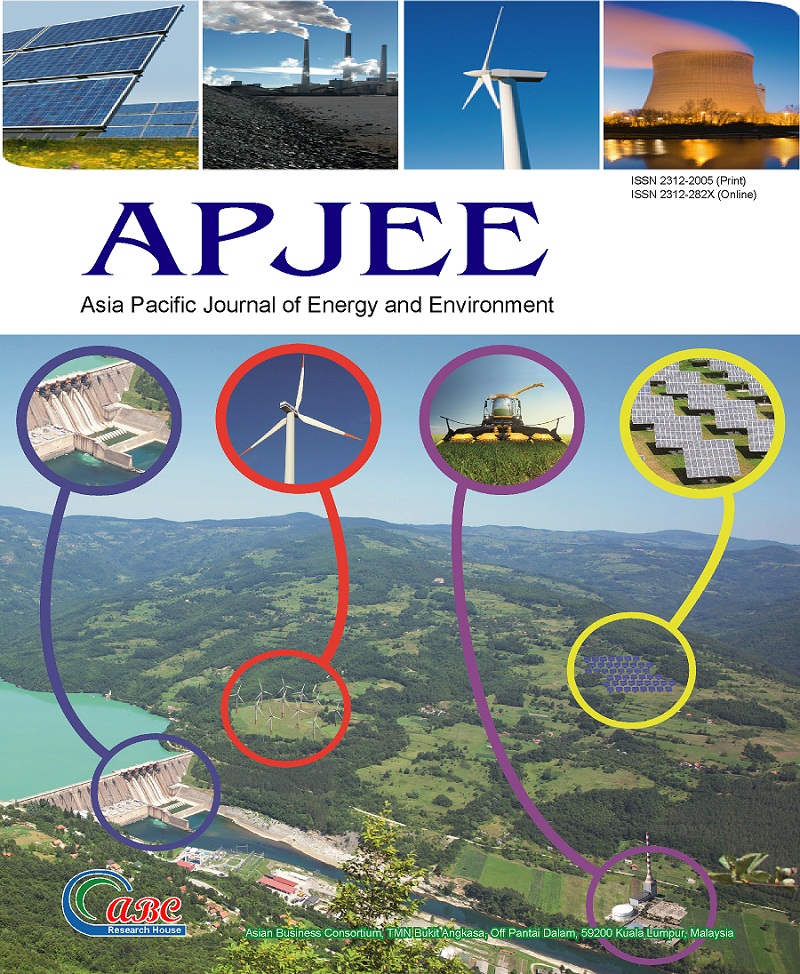Innovative Additives for Rubber: Improving Performance and Reducing Carbon Footprint
DOI:
https://doi.org/10.18034/apjee.v9i2.753Keywords:
Rubber Additives, Carbon Footprint Reduction, Polymer Science, Eco-Friendly Solutions, Advanced Materials, Rubber Technology, Green AdditivesAbstract
This study investigates how to improve performance and lessen environmental effects by integrating novel compounds into rubber. The principal aims of this study are to evaluate the potential of bio-based additives, sophisticated nanomaterials, and intelligent features to enhance rubber's mechanical, thermal, and chemical properties while reducing carbon emissions. The research assesses recent developments and potential future directions through an extensive secondary data analysis. Important discoveries show that carbon nanotubes and graphene considerably improve durability and tensile strength, while bio-based additives lessen reliance on fossil fuels. The automotive sector benefits significantly from these additives' lightweight and increased energy efficiency. The report also emphasizes the necessity of sustainable end-of-life management and enhanced recyclability. The analysis highlights the significance of policy interventions despite the high costs and scaling issues associated with these materials. To encourage the use of sustainable additives, governments must fund R&D, set precise guidelines, and promote recycling. The rubber sector may make great strides and contribute to industrial performance and environmental sustainability by addressing these constraints through supporting legislation. This study highlights how cutting-edge additives can revolutionize rubber technology in the future.
Downloads
References
Addimulam, S., Mohammed, M. A., Karanam, R. K., Ying, D., Pydipalli, R., Patel, B., Shajahan, M. A., Dhameliya, N., & Natakam, V. M. (2020). Deep Learning-Enhanced Image Segmentation for Medical Diagnostics. Malaysian Journal of Medical and Biological Research, 7(2), 145-152. https://mjmbr.my/index.php/mjmbr/article/view/687
Ahangar-Asr, A., Faramarzi, A., Javadi, A. A., Giustolisi, O. (2011). Modelling Mechanical Behaviour of Rubber Concrete using Evolutionary Polynomial Regression. Engineering Computations, 28(4), 492-507. https://doi.org/10.1108/02644401111131902 DOI: https://doi.org/10.1108/02644401111131902
Ataei, H. (2016). Experimental Study of Rubber Tire Aggregates Effect on Compressive and Dynamic Load-bearing Properties of Cylindrical Concrete Specimens. The Journal of Material Cycles and Waste Management, 18(4), 665-676. https://doi.org/10.1007/s10163-015-0362-2 DOI: https://doi.org/10.1007/s10163-015-0362-2
Basupi, I., Kapelan, Z., Butler, D. (2013). Reducing Lifecycle Carbon Footprints in the Redesign of Water Distribution Systems. Journal of Water and Climate Change, 4(3), 176-192. https://doi.org/10.2166/wcc.2013.004 DOI: https://doi.org/10.2166/wcc.2013.004
Daver, F., Kajtaz, M., Brandt, M., Shanks, R. A. (2016). Creep and Recovery Behaviour of Polyolefin-Rubber Nanocomposites Developed for Additive Manufacturing. Polymers, 8(12), 437. https://doi.org/10.3390/polym8120437 DOI: https://doi.org/10.3390/polym8120437
Dixit, M. K., Culp, C. H., Fernandez-Solis, J. L., Lavy, S. (2016). Reducing Carbon Footprint of Facilities Using a Facility Management Approach. Facilities, 34(3/4), 247-259. https://doi.org/10.1108/F-11-2014-0091 DOI: https://doi.org/10.1108/F-11-2014-0091
Harnnarongchai, W., Chaochanchaikul, K. (2015). Effect of Blowing Agent on Cell Morphology and Acoustic Absorption of Natural Rubber Foam. Applied Mechanics and Materials, 804, 25-29. https://doi.org/10.4028/www.scientific.net/AMM.804.25 DOI: https://doi.org/10.4028/www.scientific.net/AMM.804.25
Nizamuddin, M., Natakam, V. M., Sachani, D. K., Vennapusa, S. C. R., Addimulam, S., & Mullangi, K. (2019). The Paradox of Retail Automation: How Self-Checkout Convenience Contrasts with Loyalty to Human Cashiers. Asian Journal of Humanity, Art and Literature, 6(2), 219-232. https://doi.org/10.18034/ajhal.v6i2.751 DOI: https://doi.org/10.18034/ajhal.v6i2.751
Pydipalli, R., & Tejani, J. G. (2019). A Comparative Study of Rubber Polymerization Methods: Vulcanization vs. Thermoplastic Processing. Technology & Management Review, 4, 36-48. https://upright.pub/index.php/tmr/article/view/132
Roberts, C., Pydipalli, R., Tejani, J. G., & Nizamuddin, M. (2021). Green Chemistry Approaches to Vulcanization: Reducing Environmental Impact in Rubber Manufacturing. Asia Pacific Journal of Energy and Environment, 8(2), 67-76. https://doi.org/10.18034/apjee.v8i2.750 DOI: https://doi.org/10.18034/apjee.v8i2.750
Rodriguez, M., Tejani, J. G., Pydipalli, R., & Patel, B. (2018). Bioinformatics Algorithms for Molecular Docking: IT and Chemistry Synergy. Asia Pacific Journal of Energy and Environment, 5(2), 113-122. https://doi.org/10.18034/apjee.v5i2.742 DOI: https://doi.org/10.18034/apjee.v5i2.742
Tejani, J. G. (2017). Thermoplastic Elastomers: Emerging Trends and Applications in Rubber Manufacturing. Global Disclosure of Economics and Business, 6(2), 133-144. https://doi.org/10.18034/gdeb.v6i2.737 DOI: https://doi.org/10.18034/gdeb.v6i2.737
Tejani, J. G. (2019). Innovative Approaches to Recycling Rubber Waste in the United States. ABC Research Alert, 7(3), 181–192. https://doi.org/10.18034/ra.v7i3.660 DOI: https://doi.org/10.18034/ra.v7i3.660
Tejani, J. G. (2020). Advancements in Sustainable Rubber Production: Bio-Based Alternatives and Recycling Technologies. ABC Journal of Advanced Research, 9(2), 141-152. https://doi.org/10.18034/abcjar.v9i2.749 DOI: https://doi.org/10.18034/abcjar.v9i2.749
Tejani, J. G., Khair, M. A., & Koehler, S. (2021). Emerging Trends in Rubber Additives for Enhanced Performance and Sustainability. Digitalization & Sustainability Review, 1(1), 57-70. https://upright.pub/index.php/dsr/article/view/130
Tejani, J., Shah, R., Vaghela, H., Kukadiya, T., Pathan, A. A. (2018). Conditional Optimization of Displacement Synthesis for Pioneered ZnS Nanostructures. Journal of Nanotechnology & Advanced Materials, 6(1), 1-7. https://www.naturalspublishing.com/Article.asp?ArtcID=13193
Vignali, V., Mazzotta, F., Sangiorgi, C., Simone, A., Lantieri, C. (2016). Incorporation of Rubber Powder as Filler in a New Dry-Hybrid Technology: Rheological and 3D DEM Mastic Performances Evaluation. Materials, 9(10), 842. https://doi.org/10.3390/ma9100842 DOI: https://doi.org/10.3390/ma9100842
Zheng, W., Jia, Z., Zhang, Z., Yang, W., Zhang, L. (2016). Improvements of Lanthanum Complex on the Thermal-oxidative Stability of Natural Rubber. Journal of Materials Science, 51(19), 9043-9056. https://doi.org/10.1007/s10853-016-0157-4 DOI: https://doi.org/10.1007/s10853-016-0157-4
Downloads
Published
Issue
Section
License
Copyright (c) 2022 Deng Ying, Srinivas Addimulam

This work is licensed under a Creative Commons Attribution-NonCommercial 4.0 International License.









